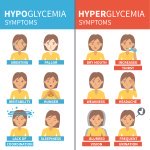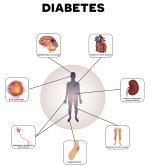Coffee and Diabetes
What’s the story with Coffee and Diabetes, you ask. In recent times, coffee has been widely touted for it presumed health benefits, which includes improved insulin sensitivity. This means that the body is a lot more responsive to both any injected and naturally produced insulin.
Many studies on this popular beverage have simply compared people who don’t drink coffee to active coffee drinkers. The challenge with this approach is that certain factors- such as having money or generally healthy lifestyle- could influence both a person’s health and how much coffee they consume.
Furthermore, it is important to note that not all evidence point to coffee having a positive effect on insulin sensitivity- most especially when obesity and other health issues enter the frame. So a recent research conducted in India may be reassuring to folks with diabetes who drink coffee.
Coffee and Diabetes – What the Research Shows
The study, published last month in the International Journal of Pharmacy and Pharmaceutical Science, looked at 200 individuals without diabetes and 90 people with Type II diabetes who are on oral diabetes drugs. A large percentage of participants in both groups- 48 in the group with diabetes and 143 in the group without diabetes- were already regular coffee consumers. The coffee consumers were instructed to drink about 4 cups of coffee each day, and all the individuals in the group were followed for 16 years.
At the end of the research period, the researchers discovered that fasting blood glucose levels were lower in coffee consumers compared with nondrinkers, within both groups. But as observed in a Medical Daily article on the research, the effect was more pronounced in participants with diabetes.
While coffee-consuming participants without diabetes had an average fasting glucose level of about 76 mg/dl compared with 79 mg/dl for nondrinkers, coffee-consuming participants with diabetes had an average glucose level of about 105 mg/dl compared with 128 mg/dl for nondrinkers.
Coffee consumers in both groups also had much lower blood levels of uric acid, which is typically associated with insulin resistance as well as kidney disease and cardiovascular disease in people with diabetes. The researchers concluded that the beneficial effects of coffee were due at least in part to chlorogenic acid, a widely studied and highly popular chemical found naturally in coffee.
Since this study observed people who already drank coffee, it can’t rule out external factors playing a part in some (or even all) of the reported benefits seen in participants who drank coffee. But given the fact that coffee drinkers with diabetes had comparatively better results than those without diabetes, it seems very unlikely that better general health or healthier lifestyle choices could explain the overall benefits seen in coffee drinkers. However, only a randomized controlled trial could show conclusively that coffee is beneficial to people with diabetes over a long period of time — and telling folks who don’t consume coffee to start drinking it every day might not be advisable.
Coffee and Diabetes - Prevention of Disease
Coffee and its effects on the risk of developing Type II diabetes have also been extensively studied a number of times and has shown notably lower risk of Type II diabetes being associated with coffee drinkers.
A 2009 research that studied 40,000 participants observed that the consumption of about 3 cups of coffee a day leads to a 40 percent lower risk of type 11 diabetes developing later in life. A recent study of healthcare providers in the UK and US, published in 2014, showed that individuals what increased their consumption of coffee experienced an 11 percent decrease in risk of Type II diabetes over the next 4 years.
Coffee an Diabetes - Losing Weight
One of the most important things I've learned recently about coffee and diabetes that made us really sit up and pay attention was a new way to approach a cup of coffee that helps diabetics lose weight. It has long been known that a low carb, ketogenic diet will stabilize blood sugars and even reverse type 2 diabetes. For people who have diabetes and like to drink coffee, there is something you can add to your coffee that makes it much easier to immediately get into ketosis so that your body is burning fat instead of sugar. It also acts as a reliable and quick source of energy from fat not sugar
If you simply add a special MCT oil called Caprylic Acid (found in coconut) known as C8 to your coffee, you can get into ketosis easier, eliminate sugar cravings and stabilize your energy levels. Beware though, because there are many knock-off MCT oils that contain high amounts of C10 (less effective) and C12 (ineffective but cheap), NOT C8. The best oil we have found for this is made by Bulletproof Coffee and is called Brain Octane Oil. Made up of 100% pure odorless, tastless, Caprylic Acid (C8) it is a great addition to your coffee if you are trying to lower your blood sugar and lose weight.
Conclusion
No food or supplement offers total protection against Type II diabetes. If you have prediabetes, losing weight and regular exercising might be the best way to reduce your risk. With respect to coffee and diabetes, taking up drinking coffee alone in order to stave off diabetes cannot guarantee a favorable outcome.
This point translates into the normal essential advice to speak to your healthcare provider or doctor before trying this or any other natural remedy or supplement. Never attempt to stop your prescribed medication without the authorization of your healthcare provider. Though, drinking coffee could help in some ways in reducing your risk of diabetes in the long run. If coffee is your choice, be sure to eat a chemical free, organic coffee to avoid toxin exposure.



New! Facebook Comments
What do you think? Share your thoughts below...